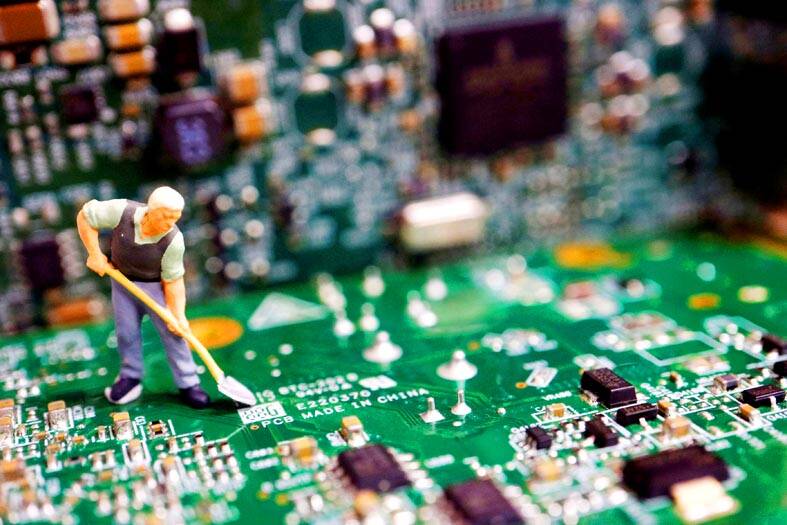The US semiconductor industry faces a shortfall of about 67,000 workers by 2030, an industry association study published yesterday said.
The chip industry’s workforce is projected to grow to 460,000 by the end of the decade, up from about 345,000 this year.
However, at the rate that people are graduating from schools, the US cannot not produce enough qualified workers to fill the increase, said the study prepared by the Semiconductor Industry Association (SIA) and Oxford Economics.

Photo: Reuters
The study comes as the US works to improve its domestic chip sector. The US’ Creating Helpful Incentives to Produce Semiconductors (CHIPS) and Science Act, which sets aside money for new manufacturing sites, and research and development, was signed into law on Aug. 9 last year.
The US Department of Commerce is overseeing the US$39 billion in manufacturing subsidies stipulated under the act, and companies such as Intel Corp, Taiwan Semiconductor Manufacturing Co (台積電) and Samsung Electronics Co have said they would apply for them.
The law also created a 25 percent investment tax credit for building new chip factories, or fabs, that is worth US$24 billion.
Those factories would create jobs, the SIA said.
The projected shortage includes computer scientists, engineers and technicians. Roughly half of future chip industry jobs are expected to be for engineers.
“This has been a problem that we’ve been facing for a long time,” SIA president John Neuffer said. “But with the CHIPS Act in particular, and the kind of the bending the arc of history towards more manufacture here on US shores, it really kind of threw this acute problem into bold relief.”
The shortage of skilled chip workers is part of a larger shortfall of science, technology, engineering and math graduates in the US, the report said, adding that by the end of this year, 1.4 million positions might go unfulfilled.

Taiwan Semiconductor Manufacturing Co (TSMC, 台積電) secured a record 70.2 percent share of the global foundry business in the second quarter, up from 67.6 percent the previous quarter, and continued widening its lead over second-placed Samsung Electronics Co, TrendForce Corp (集邦科技) said on Monday. TSMC posted US$30.24 billion in sales in the April-to-June period, up 18.5 percent from the previous quarter, driven by major smartphone customers entering their ramp-up cycle and robust demand for artificial intelligence chips, laptops and PCs, which boosted wafer shipments and average selling prices, TrendForce said in a report. Samsung’s sales also grew in the second quarter, up

LIMITED IMPACT: Investor confidence was likely sustained by its relatively small exposure to the Chinese market, as only less advanced chips are made in Nanjing Taiwan Semiconductor Manufacturing Co (TSMC, 台積電) saw its stock price close steady yesterday in a sign that the loss of the validated end user (VEU) status for its Nanjing, China, fab should have a mild impact on the world’s biggest contract chipmaker financially and technologically. Media reports about the waiver loss sent TSMC down 1.29 percent during the early trading session yesterday, but the stock soon regained strength and ended at NT$1,160, unchanged from Tuesday. Investors’ confidence in TSMC was likely built on its relatively small exposure to the Chinese market, as Chinese customers contributed about 9 percent to TSMC’s revenue last

LOOPHOLES: The move is to end a break that was aiding foreign producers without any similar benefit for US manufacturers, the US Department of Commerce said US President Donald Trump’s administration would make it harder for Samsung Electronics Co and SK Hynix Inc to ship critical equipment to their chipmaking operations in China, dealing a potential blow to the companies’ production in the world’s largest semiconductor market. The US Department of Commerce in a notice published on Friday said that it was revoking waivers for Samsung and SK Hynix to use US technologies in their Chinese operations. The companies had been operating in China under regulations that allow them to import chipmaking equipment without applying for a new license each time. The move would revise what is known

UNCERTAINTY: A final ruling against the president’s tariffs would upend his trade deals and force the government to content with billions of dollars in refunds The legal fight over US President Donald Trump’s global tariffs is deepening after a federal appeals court ruled the levies were issued illegally under an emergency law, extending the chaos in global trade. A 7-4 decision by a panel of judges on Friday was a major setback for Trump, even as it gives both sides something to boast about. The majority upheld a May ruling by the Court of International Trade that the tariffs were illegal. However, the judges left the levies intact while the case proceeds, as Trump had requested, and suggested that any injunction could potentially be narrowed to apply